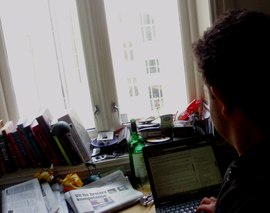(via Gumsagumlao.dk) One more Danish anthroblogger: Rune Kier Nielsen is doing research on the black consciousness movement in Brasil. In his first post (three months ago) he writes:
I am writing this blog for me to reflect on an upcomming challenge in my life: Anthropological Fieldwork, and later retrace my path of knowledge. Hopefully the challenge will be met, and maybe, just maybe, this can be of some use to other students of anthropology or related -ologies.
This blog may also be of some interest as to the region of my fieldwork: The city of Salvador da Bahia, Brazil, or the subject of my study: Narrative constructions of race in the black consciousness movement (o movimento negro) and what that path of life offers in opposition to other possibilities.
I’ve just scanned a few entries, but it seems that the blog is a quite detailed and interesting account of his fieldwork.
In his most recent blog post he tells us that he has “come a long way since my initial frustrations with lack of participation and canceling informants”:
The last couple of weeks have been full of participation, the kind I prayed for in Denmark and thought impossible at first in Brazil. The kind of participation where you follow one activist around, from one social setting to the other and watch the changes that occur. Family, friends, parties, hobbies, introductions, trusted conversations and confidence – and all the other stuff.
This has been great and a important part of my study (and I predict, a big part of my final paper), but it cannot be the only part – it cannot stand alone. For this reason I have stepped up my interview activities to widen the study a bit.
Some days ago he wrote enthusiastically:
I praise my decision to do a urban fieldwork. At the moment I don’t know how people can live in a longhouse in a small village on Java for three months without the possibility to withdraw once in a while.
Here, he reflects about having one’s girlfriend in the field: Will she hold you back from full participation? Rather not, it seems:
[Trust] is an important word in Anthropology, especially as the trust people give our discipline rests on the trust we gain from our informants, which in turn rests on the trust we give them, although by no means in a deterministic relation.
When I think back, all the times I have mentioned that my girlfriend was coming to visit, there has been enthusiastic responses. People have liked to talk about it and have expressed (repeatedly) that they would like to meet her. The requests have been more insistent than I would expect from politeness or common curiosity. And maybe this is not so strange.
Anthropologists often are the stranger arriving from some unknown land. (…) The anthropologist is alone! He usually has no family in the field, making him ‘matter out of place’ in a kinship society with strong family solidarity and mutual help. I imagine that here as elsewhere there is a common sensical assumption that if you know someone’s family you can trust them. It is quite common to threaten about ‘telling’ the family (mother, father, brother or sister). Being part of a known family makes you trustworthy and sharing that family with others is a show of trust.
>> visit Rune’s Blog: Blogging anthropological fieldwork in Brazil
(via Gumsagumlao.dk) One more Danish anthroblogger: Rune Kier Nielsen is doing research on the black consciousness movement in Brasil. In his first post (three months ago) he writes:
I am writing this blog for me to reflect on an upcomming challenge…
Read more


 It’s a privilege to be an anthropologist on fieldwork. Reading
It’s a privilege to be an anthropologist on fieldwork. Reading